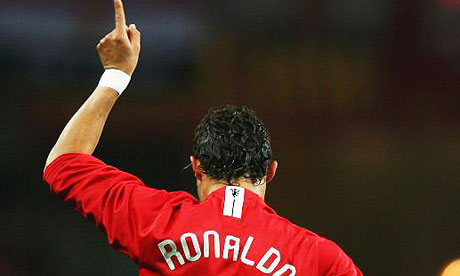
An
intriguing story in today's Observer about Cristiano Ronaldo and his (alleged) seven-months-in-the-making transfer to Real Madrid.
According to journalist Duncan Castles, CR has been doing all the engineering of this move on his own, and his agent had been repeatedly counselling against a move. Even Real Madrid are apparently annoyed at how publicly he's been flaunting his desire to leave (this I find hard to believe, but I'm just relaying the story here).
Specifically, Ronaldo seems to be labouring under the impression (some might call it a delusion) that having more or less single-handedly delivered two trophies to Old Trafford this year, the Man United board would be happy to "reward" him by allowing him his dream move to Madrid.
This does sound a little wacky, but I think it's a piece of cultural misunderstanding.
In Iberian football, certainly, when either Barcelona or ManU come calling, you leave. End of story. Take Sergio Ramos (please) who literally bought out his own contract at Sevilla just hours before the transfer deadline in order to play for the
merengues.
What was considered shameful about the Ramos transfer was not the fact that he went to Madrid, but rather the sneaky way he did it, just as the club was starting to develop into something of a powerhouse. He left, if you will, via the back door.
Contrast this with the Dany Alves saga of last summer. Alves felt that after helping Sevilla to five trophies in two years, he had earned the right to leave "by the front door", with his head held high. And so he was quite miffed when Sevilla failed to sell him to Chelsea; it took him about two months to get his head back in the game for the
rojiblancos (although to be fair, the death of Antonio Puerta probably had an impact too) and by the time he was back to his best, Sevilla were too far behind the leaders to challenge for the title even in a year when no one seemed to want it. Ronaldo, being Iberian himself, seems to be taking the same position Alves took last year.
I've earned this - you owe it to me.
The English, remarkably, don't see things the same way. Winning teams are kept together almost regardless of the cost. Patrick Vieira was mercilessly persued by Madrid after both Arsenal's 2002 and 2004 championship season. Wenger stuck to his guns and kept the midfielder only to sell him for much, much less the next season (2005).
It's partly the way the English view club loyalty. They are far more likely to view team failure as a valid excuse for departure ("oh well, he wants to go win some trophies, I guess") than they are team success ("but he's won everything with us - why does he want to go when everything is going so well?")
That's not to say that ManU won't sell, of course - the Glazers' holding company is holding far too much debt for them not to be seriously tempted by the 85 or 90 million euros his sale would bring. But letting him leave as a reward for success? Never. The fact that Ronaldo hasn't figured that out after five years in England suggests that he hasn't been paying attention during his stay there.
But then again, if he only ever thought that Manchester was a penitence to pay on the way to the Bernabeu, maybe he never felt the need to pay attention.
 I'm finally getting into some summer reading, and that always means football books. So here's the first of what I'm assuming will be many book reviews, on a new book called Comrade Jim.
I'm finally getting into some summer reading, and that always means football books. So here's the first of what I'm assuming will be many book reviews, on a new book called Comrade Jim.
